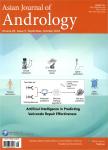The androgen receptor in hormone-refractory prostate cancer
The androgen receptor in hormone-refractory prostate cancer作者机构:State Key Laboratory of Molecular Biology Shanghai Key Laboratory of Andrology Institute of Biochemistry and CellBiology Shanghai Institutes for Biological Sciences Chinese Academy of Sciences Shanghai 200031 China Affiliated Hospital of Nantong University Nantong 226001 China
出 版 物:《Asian Journal of Andrology》 (亚洲男性学杂志(英文版))
年 卷 期:2009年第11卷第1期
页 面:69-73页
核心收录:
学科分类:1002[医学-临床医学] 100214[医学-肿瘤学] 10[医学]
基 金:Work in this laboratory is supported by the Chinese Academy of Sciences (KSCX2-YW-R-04) the National Basic Research Program of China (973 Program) (2007CB947900) the Shanghai Pujiang Plan (07pj 14097) and the National Natural Science Foundation of China (30870538)
主 题:prostate cancer hormone therapy androgen receptor hormone-refractory prostate cancer
摘 要:Advanced prostate cancer is responsive to hormone therapy that interferes with androgen receptor (AR) signalling. However, the effect is short-lived, as nearly all tumours progress to a hormone-refractory (HR) state, a lethal stage of the disease. Intuitively, the AR should not be involved because hormone therapy that blocks or reduces AR activity is not effective in treating HR tumours. However, there is still a consensus that AR plays an essential role in HR prostate cancer (HRPC) because AR signalling is still functional in HR tumours. AR signalling can be activated in HR tumours through several mechanisms. First, activation of intracellular signal transduction pathways can sensitize the AR to castrate levels of androgens. Also, mutations in the AR can change AR ligand specificity, thereby allowing it to be activated by non-steroids or anti-androgens. Finally, overexpression of the wild-type AR sensitizes itself to low concentrations of androgens. Therefore, drugs targeting AR signalling could still be effective in treating HRPC.



